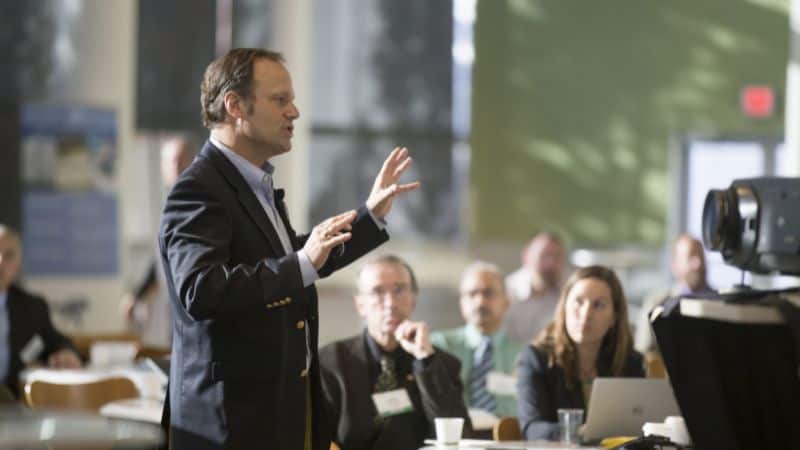Public speaking is so simple that it is often difficult.
At its core, public speaking is the act of communicating information, ideas, or feelings to a group of people. It’s not just about standing on a stage or in front of a camera. It’s about connecting with an audience, getting your message across, and making a lasting impact.
Public speaking is everywhere. From giving a presentation at work, to telling a story at a family gathering, to addressing a crowd at an event, we all find moments in our lives where we need to speak up and be heard.
It’s an essential skill for success in many fields and can boost your confidence in any situation. By becoming a good public speaker, you empower yourself to influence, inspire, and lead.
My journey with public speaking started back in high school. I remember the thrill of sharing my thoughts, the nervousness before stepping onto the stage, and the joy of connecting with an audience.
Over the years, my passion grew. I delved into countless books, eager to learn every nuance of this art. From being a retreat master, teacher, and debater, to coaching debates and presenting as an orator, every role added a new dimension to my understanding of public speaking.
In 2004, I took the leap to turn this passion into a profession. And today? I want to share the wisdom and insights I’ve gathered along the way with you.
Together, we’ll embark on a journey to find your voice and elevate your speaking skills.
Public speaking isn’t just about delivering a message—it’s about leading people. If you want to grow your influence, explore my Leadership Training programs.
What Really Is Public Speaking
Most people imagine public speaking as standing on a stage, holding a microphone, and talking to hundreds of people. That’s one version—but it’s not the only one. Public speaking is simply the act of sharing your voice with others in a way that moves them. It could be in a meeting, a classroom, or even during a family celebration.
Think of it less as “performing” and more as connecting. When you speak, you’re not just transferring information. You’re building trust, influencing decisions, or inspiring action. That’s why I believe public speaking is not a skill reserved for politicians or motivational speakers—it’s a life skill for everyone.
And here’s the truth: you’re already doing it. Every time you explain an idea to your boss, defend your thesis, or toast at a wedding, you’re speaking in public. The only question is whether you do it with fear or with confidence. My goal is to help you choose confidence.
Why Public Speaking Matters
Opportunities often come to those who are ready to speak. Think about it—whether in business, school, or community life, the person who can stand up and express ideas clearly often becomes the leader by default. Others may have brilliant ideas, but if they stay silent, their impact is lost.
Public speaking matters because it multiplies your influence. A single good talk can inspire a team, close a deal, or rally people to a cause. One speech, well delivered, can open doors that months of quiet hard work cannot.
But it’s not just about careers or promotions. Speaking in public teaches you to think clearly, listen better, and respect the power of words. When you learn to speak with courage, you also learn to live with courage. That’s why I always say: public speaking is not just about the stage—it’s about how you show up in life.
The First Step is Not the Stage
Many beginners make the mistake of aiming too high too soon. They imagine themselves speaking in a big auditorium before they’ve even spoken in a small room. That’s like running a marathon without first learning how to jog.
The first step in public speaking is not the stage. It’s saying something small, in a safe space. Speak in your study group. Share a story in a team huddle. Volunteer to introduce someone at a meeting. Each moment you speak is a rehearsal for something bigger.
This is how confidence grows—one small “yes” at a time. When you practice in manageable settings, you reduce fear and build skill at the same time. Eventually, the bigger stage won’t feel like a jump. It will feel like a natural next step. And when you get there, you’ll be ready.
How I Help Beginners
I’ve been training speakers for more than 20 years, and I’ve learned that most people don’t need fancy tricks or dramatic techniques. They need safe spaces, clear guidance, and small wins that build momentum. That’s where I come in.
I start by helping beginners see that fear is normal. You don’t have to erase it—you just need to work with it. Then, I guide them through simple practices: telling short stories, speaking up in small groups, and learning how to pause instead of panic.
Over time, those who once thought they “weren’t born speakers” discover that public speaking is a learnable skill. I’ve seen shy students grow into confident leaders, and nervous employees turn into trusted presenters. That transformation is why I do this work. And if you’re just starting, I’d be glad to walk with you too.
Get Started Today
You don’t have to wait for the perfect time, the right training, or a big stage. The best way to start in public speaking is to start where you are. Think of one opportunity this week where you can speak up—maybe a team meeting, maybe a family gathering. Take that chance.
Remember: your first speech doesn’t have to be perfect. It just has to be honest. Speak from your own experience. Share a story that matters to you. People connect not with polished performance, but with genuine presence.
And if you want a guide, I’m here. I’ve designed workshops, playbooks, and coaching sessions that can help you grow faster, avoid common mistakes, and build confidence step by step. Your voice deserves to be heard. Don’t wait for “someday.” Start today.
Steps to Get Started in Public Speaking
When preparing for a speech, it’s not just about rehearsing your lines. Think of it like getting ready for a big game or a stage performance. It’s about tuning your whole self – your body, mind, and heart.
Just like how a singer warms up their voice or a runner stretches before a race, you need to prepare in a complete way.
This ensures that when you speak, you’re not just sharing words, but you’re connecting, engaging, and leaving a lasting impression.
Step 1: Physical Preparation – Your Body as the Instrument
Before stepping onto the stage, remember that your body is the vessel delivering your message.
Just as a musician tunes their instrument, you need to condition your body.
Start with vocal warm-ups, simple exercises like humming or singing scales to get your vocal cords ready.
Ensure you maintain a strong posture and engage in deep breathing; it not only provides the airflow needed for a robust voice but also instills a sense of calm.
Lastly, don’t forget about regular physical exercise. Just as it keeps your body healthy, it prepares you for the physical act of speaking, increasing stamina and confidence.
Step 2: Mental Preparation – Setting the Mindset
Your mental state can be the linchpin of your presentation’s success.
Use visualization techniques where you close your eyes and picture yourself giving a successful speech. This not only builds confidence but prepares your mind for the task ahead.
Integrate mindfulness and meditation into your routine; it keeps you present and wards off overthinking.
When doubts creep in, combat them with positive affirmations. Instead of being trapped by thoughts like “I can’t do this,” empower yourself with affirmations like “I am prepared, and I can handle this.”
Step 3: Spiritual Preparation – Connecting with Purpose
Every speech has a deeper purpose. Dive into that purpose with spiritual preparation.
Take moments of reflection to understand the core essence of your message. What change are you championing? What difference do you hope to make?
Being purpose-driven amplifies your connection with the audience; when they sense your genuine commitment, they’re more likely to engage.
Before taking the stage, use grounding techniques to center yourself, feeling the world around you and anchoring yourself in the present moment.
Step 4: Embrace the Holistic Approach
Harmony in your preparation process is where the magic happens. When your body is energized, your mind focused, and your spirit aflame with purpose, that’s when you truly resonate with your audience.
Practice makes permanent. The more you embed this triad of preparation into your routine, the more instinctual it becomes.
Dedicate time daily for this holistic preparation, ensuring that when the spotlight is on, you shine not just as a speaker, but as an inspiration.
By weaving these steps into your preparation routine, you set the stage (quite literally) for speeches that leave a mark, not just because of the words said, but because of the holistic presence behind them.
Every great leader is a great communicator. That’s why my Leadership Training also helps leaders master public speaking as a tool for influence.
4 Myths About Public Speaking
During my public speaking training sessions for managers, I always make it a point to have an open dialogue. It’s not just me teaching, but also learning from the participants. Here’s a glimpse of some enlightening exchanges that unfolded in one such workshop

1. Natural Talent Vs. Skill
Scene: A dimly lit conference room. Projector humming softly in the background. A young manager named Mia raises her hand.
Mia: “I’ve always felt that great speakers are just born with it. I mean, look at those TED Talk presenters! They seem to have a natural gift. Maybe it’s just not for people like me?”
Me: “That’s a common thought, Mia. But in my experience, while some have a slight advantage, public speaking is more skill than talent. Do you remember the first time you rode a bike?”
Mia: “Of course. Fell down plenty of times before getting the hang of it.”
Me: “Exactly. And speaking is like that. It’s about practice, feedback, and learning. Many of those TED speakers? They’ve had countless hours of practice and coaching behind that ‘natural’ talent.”
2. You Must Speak Flawlessly
Scene: Break time. Coffee machine buzzing. A tall man, Jack, approaches with a thoughtful look.
Jack: “Whenever I see accomplished speakers, they seem so perfect. No mistakes, no hesitations. Makes me nervous to even try.”
Me: “Jack, have you ever listened to a speech and connected more with the speaker’s passion than their perfect words?”
Jack: “Yeah, I remember a speaker once fumbling a bit but his story was so compelling that it hardly mattered.”
Me: “That’s it! Authenticity often trumps perfection. People connect with real emotions and stories, not just flawlessly delivered words.”
3. Great Speakers Are Always Confident
Scene: After a speaking drill. A nervous participant named Lisa is getting feedback.
Lisa: “I just felt so nervous up there. I don’t think I can ever be as confident as great speakers.”
Me: “Lisa, would you believe me if I told you that even I get nervous sometimes before big presentations?”
Lisa: “Really? But you seem so composed!”
Me: “It’s natural to feel butterflies. The trick is to channel that nervous energy into passion for your topic. Even seasoned speakers have their moments of doubt. It’s about managing those feelings and pushing forward.”
4. More Words Mean More Impact
Scene: During a lunch break. Clara, an enthusiastic participant, chats while having her sandwich.
Clara: “I always thought the more I say, the more impactful my speech will be. So I tend to pack in a lot of information.”
Me: “It’s a common notion, Clara. But think about it. Have you ever listened to someone and wished they’d get straight to the point?”
Clara: “Oh, all the time! Especially in those never-ending meetings.”
Me: “There you go! A clear, concise message often resonates more. It’s not about how much you say, but what you say and how you say it.”
These real conversations from my workshops highlight that everyone, no matter their level, has doubts and misconceptions. The journey to becoming a great public speaker is about understanding, practice, and continual growth.
Understanding Stage Fright
Scene: An afternoon training session. The room has that post-lunch lull. There’s a palpable tension in the air as participants know they’ll soon be doing mock presentations. Sarah, a mid-level executive, hesitantly raises her hand.
Sarah: “I’m not sure I can do this. Every time I think about speaking in front of everyone, my stomach does somersaults.”
Me: “Sarah, believe it or not, your feelings are more common than you think. Do you know that public speaking is one of the top fears worldwide, sometimes even ranking above the fear of heights or spiders?”
Sarah: “Really? But why?”
Me: “For many, it’s the fear of judgment, of making a mistake in front of others, or simply being the center of attention. The spotlight can be intimidating.”
Scene: A smaller breakout session. A group is discussing their past experiences. Raj, a manager with years of experience but new to public speaking, chimes in.
Raj: “I remember my first time presenting a report. I barely slept the night before, kept rehearsing in my head. When the time came, my voice trembled, and I just wanted it to end.”
Me: “That’s what I call the ‘Mental Agony’ phase. Our minds can sometimes be our own worst enemies, building up anxiety and stress. But here’s a thought: Did the audience notice?”
Raj: “A few did, but most were focused on the content. And a colleague even complimented me on the details.”
Me: “Exactly. We often magnify our fears and mistakes in our minds, but the audience is usually more forgiving and focused on the message, not the messenger.”
Scene: Wrapping up the day. Tom, an older gentleman who’s seen many a boardroom, shares his piece.
Tom: “You know, I’ve been in business for decades, and I’ve seen people tremble and falter. But the ones who owned their fears, acknowledged them, and worked on them? They were the ones who left a mark.”
Me: “Beautifully said, Tom. Fear is natural, but letting it control you is counterproductive. By understanding it, facing it, and practicing, we can turn that fear into fuel for growth.”






